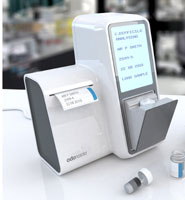
Problem being addressed[edit | edit source]
Waterborne diarrheal diseases account for a majority of illness and deaths in developing countries, especially among children. The lack of efficient, accurate, and inexpensive diagnostic technologies to effectively control the spread of such infectious diseases poses a serious threat to the health of populations.
Detailed description of the solution[edit | edit source]
The OdoReader is a battery-powered, cost-effective device that accurately diagnoses gastrointestinal diseases by analyzing volatile gases released from diarrheal stool samples. Odors captured by the device are blown over an internal sensor and processed by neural networks to display diagnoses and relevant treatment options. Initially designed to detect Clostridium difficile, the OdoReader is being further developed to detect other types of bacteria as well.
Relevance to developing country settings[edit | edit source]
The OdoReader has application in developing world settings as it is a robust, portable, inexpensive, and rapidly-functioning diagnostic device that requires no special skills or knowledge to be operated. Also, it is battery powered.
Designed by[edit | edit source]
- Designed by
- Dr. Norman Ratcliffe from the University of the West of England and Dr. Chris Probert from the University of Bristol
Funding Source[edit | edit source]
This device has philanthropic funding from the Wellcome Trust.
References[edit | edit source]
Peer-reviewed publication[edit | edit source]
- Abdullah, R., & Santos, H. (2010). OTM Machine Acceptance: In the Arab Culture. Communications in Computer and Information Science, 92, 131-138.
Internally generated reports[edit | edit source]
- Bristol Research and Innovation Group for Health. (2011). Bristol Health Innovation Showcase 2011 [Brochure]. PDF available here.
- Research showcase | The diarrhoea diagnostic device: from bench to bedside. (n.d.). University of the West of England. Link available here.
- University of Bristol. (5 Feb 2010). Device to sniff out stomach bugs could save NHS millions [Press Release]. Link available here.
- (5 Feb 2010). "New odour-reading device sniffs out super bug." Wellcome Trust. Link available here.
Externally generated reports[edit | edit source]
- Alleyne, R. (5 Feb 2010). "New device literally smells out stomach bugs." The Telegraph. Link available here.
- BBC News. (5 Feb 2010). "Bristol universities' device to 'sniff out' infection." Link available here.
- World Health Care Congress. (16 June 2010). "Odoreader: A diagnostic tool to stop a global killer" [Video file]. Youtube link available here.